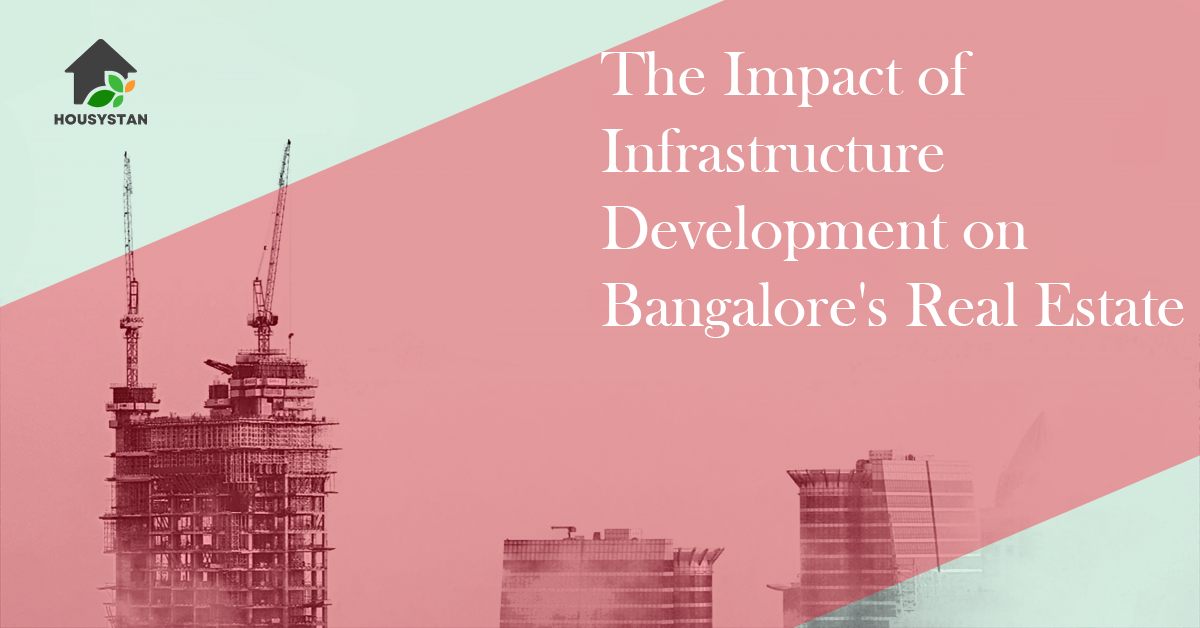The Impact of Infrastructure Development on Bangalore's Real Estate
Read latest blogs and articles from Housystan

The Information mentioned here was last updated on:
17/2/2026The Transformative Impact of Infrastructure Development on Bangalore’s Real Estate Market
Introduction: Bangalore’s Real Estate Evolution
Bangalore, often referred to as India’s Silicon Valley, has witnessed a remarkable transformation over the last two decades. The city’s growth trajectory is closely linked to its dynamic infrastructure development, which has significantly influenced the real estate landscape. From world-class metro systems and expressways to tech parks and social amenities, Bangalore’s infrastructure advancements have driven property demand, altered investment patterns, and contributed to the city’s rapid urbanisation. This article explores how infrastructure development is reshaping Bangalore’s real estate sector, the key projects making a difference, and what homebuyers and investors should expect in the coming years.
- Verified Tenants/Buyers
- Unlimited Property Listing
- Zero subscription/charges fee
The Nexus Between Infrastructure and Real Estate Growth
Infrastructure development and real estate growth are intrinsically connected. Improved transportation networks, enhanced connectivity, and upgraded civic amenities make neighbourhoods more accessible and liveable. In Bangalore, the influence of infrastructure can be seen in rising property values, increased demand for both commercial and residential spaces, and the emergence of new growth corridors.
As the city expands, infrastructure projects such as the Bangalore Metro, Peripheral Ring Road, Elevated Expressways, and the Suburban Rail Network are transforming once remote areas into prime real estate destinations. Enhanced connectivity reduces travel times, making fringe locations more attractive for both homeowners and businesses. This shift not only boosts property values but also spurs further development in adjacent areas.
Metro Rail: The Game Changer for Connectivity
The Namma Metro project stands out as a flagship initiative in Bangalore’s infrastructure journey. With multiple operational lines and new phases under construction, the metro network has fundamentally changed commuting patterns. Areas along the metro corridors, such as Yeshwanthpur, Indiranagar, Jayanagar, and Whitefield, have experienced a surge in property demand.
Easy access to the metro has encouraged professionals and families to relocate closer to stations, resulting in higher absorption rates for residential properties. Commercial hubs along these routes have also thrived due to better accessibility for employees and clients. As new metro lines extend to peripheral zones, these regions are poised to become the next hotspots for real estate investment.
Peripheral Ring Road and Elevated Expressways: Unlocking New Growth Corridors
The proposed Peripheral Ring Road (PRR) and completed elevated expressways like the NICE Road and Electronics City Elevated Expressway have played pivotal roles in decongesting Bangalore’s core areas. These infrastructure projects have opened up vast tracts of land in the city’s outskirts, which were previously considered inaccessible or underdeveloped.
Neighbourhoods such as Hoskote, Devanahalli, Sarjapur, and Attibele have seen a spike in residential and commercial projects. Improved road connectivity has facilitated the movement of goods and people, leading to the establishment of tech parks, logistics hubs, and integrated townships. Investors are keenly eyeing these corridors, anticipating significant appreciation in property values as planned infrastructure reaches completion.
Tech Parks and Commercial Hubs: Driving Demand for Residential Projects
Bangalore’s rise as an IT and technology epicentre has been fuelled by the proliferation of tech parks and special economic zones (SEZs). Areas like Whitefield, Electronic City, Manyata Tech Park, and Outer Ring Road are home to major multinational companies and start-ups, attracting a skilled workforce from across the country.
This influx has created a robust demand for quality housing, especially gated communities, apartments, and villas with modern amenities. Developers are responding by launching premium residential projects within close proximity to commercial hubs, ensuring professionals spend less time commuting and enjoy a better work-life balance. The symbiotic relationship between tech park development and real estate growth is a defining feature of Bangalore’s urban expansion.
Social Infrastructure: Enhancing Quality of Life
Beyond transportation and commercial hubs, Bangalore’s infrastructure development also encompasses social amenities like schools, hospitals, shopping malls, and recreational spaces. The emergence of reputed educational institutions, world-class healthcare facilities, and vibrant retail destinations has made the city’s suburbs more attractive for families and young professionals alike.
This comprehensive development ensures that new residential zones are not just affordable, but also offer a high quality of life. Areas like North Bangalore, Sarjapur Road, and Kanakapura Road have become preferred choices for homebuyers seeking a blend of connectivity, convenience, and comfort.
Government Initiatives and Policy Reforms
The Karnataka state government and Bangalore city authorities have played a proactive role in fostering infrastructure-led growth. Initiatives such as the Bangalore Development Authority’s (BDA) master plans, ease of doing business reforms, and the implementation of RERA (Real Estate Regulatory Authority) have instilled greater transparency and confidence in the real estate sector.
Single-window clearances for large infrastructure projects and incentives for affordable housing have encouraged developers to explore new locations while adhering to regulatory frameworks. These measures have increased investor trust and accelerated the pace of both public and private sector projects across Bangalore.
Challenges and the Road Ahead
While Bangalore’s infrastructure boom has positively impacted real estate, challenges like traffic congestion, water scarcity, and environmental concerns persist. Rapid urbanisation must be balanced with sustainable planning to ensure long-term viability. Green building practices, rainwater harvesting, and waste management solutions are increasingly being integrated into new projects to address these issues.
The future of Bangalore’s real estate hinges on the timely completion of ongoing infrastructure projects, effective governance, and continuous investment in upgrading utilities and amenities. As the city prepares for further expansion, collaboration between government agencies, developers, and citizens will be crucial in shaping a sustainable urban ecosystem.
Conclusion: A Dynamic Landscape for Homebuyers and Investors
Infrastructure development continues to be the driving force behind Bangalore’s ever-evolving real estate market. Enhanced connectivity, thriving commercial hubs, and improved social amenities are transforming the city’s skyline and unlocking new opportunities for both homebuyers and investors. With strategic planning, visionary policies, and a focus on sustainability, Bangalore is poised to cement its position as one of India’s most vibrant and resilient real estate destinations for years to come.